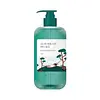What's inside
What's inside
 Key Ingredients
Key Ingredients

 Benefits
Benefits

 Concerns
Concerns

 Ingredients Side-by-side
Ingredients Side-by-side

Water
Skin ConditioningSodium C14-16 Olefin Sulfonate
CleansingPinus Densiflora Leaf Extract
AntimicrobialLauryl Betaine
CleansingSodium Chloride
MaskingAllantoin
Skin ConditioningBetaine
HumectantPanthenol
Skin ConditioningSalicylic Acid
MaskingSodium Hyaluronate
HumectantHydrolyzed Hyaluronic Acid
HumectantSodium Acetylated Hyaluronate
HumectantButylene Glycol
HumectantCentella Asiatica Extract
CleansingMelia Azadirachta Flower Extract
Skin ConditioningMelia Azadirachta Leaf Extract
Skin ConditioningGlycoproteins
Skin ConditioningSorbitol
HumectantCitric Acid
BufferingGluconolactone
Skin ConditioningAsiaticoside
AntioxidantAsiatic Acid
Skin ConditioningMadecassic Acid
Skin ConditioningMadecassoside
AntioxidantCaprylyl Glycol
EmollientCitrus Limon Fruit Extract
MaskingCitrus Nobilis Oil
MaskingLavandula Angustifolia Oil
MaskingEucalyptus Globulus Leaf Oil
PerfumingJuniperus Mexicana Oil
MaskingPinus Palustris Oil
MaskingC12-14 Pareth-12
EmulsifyingHexadecene
SolventTetradecene
EmollientTromethamine
Buffering1,2-Hexanediol
Skin ConditioningDisodium EDTA
Limonene
PerfumingWater, Sodium C14-16 Olefin Sulfonate, Pinus Densiflora Leaf Extract, Lauryl Betaine, Sodium Chloride, Allantoin, Betaine, Panthenol, Salicylic Acid, Sodium Hyaluronate, Hydrolyzed Hyaluronic Acid, Sodium Acetylated Hyaluronate, Butylene Glycol, Centella Asiatica Extract, Melia Azadirachta Flower Extract, Melia Azadirachta Leaf Extract, Glycoproteins, Sorbitol, Citric Acid, Gluconolactone, Asiaticoside, Asiatic Acid, Madecassic Acid, Madecassoside, Caprylyl Glycol, Citrus Limon Fruit Extract, Citrus Nobilis Oil, Lavandula Angustifolia Oil, Eucalyptus Globulus Leaf Oil, Juniperus Mexicana Oil, Pinus Palustris Oil, C12-14 Pareth-12, Hexadecene, Tetradecene, Tromethamine, 1,2-Hexanediol, Disodium EDTA, Limonene
 Reviews
Reviews

Ingredients Explained
These ingredients are found in both products.
Ingredients higher up in an ingredient list are typically present in a larger amount.
Butylene Glycol (or BG) is used within cosmetic products for a few different reasons:
Overall, Butylene Glycol is a safe and well-rounded ingredient that works well with other ingredients.
Though this ingredient works well with most skin types, some people with sensitive skin may experience a reaction such as allergic rashes, closed comedones, or itchiness.
Learn more about Butylene GlycolCitric Acid is an alpha hydroxy acid (AHA) naturally found in citrus fruits like oranges, lemons, and limes.
Like other AHAs, citric acid can exfoliate skin by breaking down the bonds that hold dead skin cells together. This helps reveal smoother and brighter skin underneath.
However, this exfoliating effect only happens at high concentrations (20%) which can be hard to find in cosmetic products.
Due to this, citric acid is usually included in small amounts as a pH adjuster. This helps keep products slightly more acidic and compatible with skin's natural pH.
In skincare formulas, citric acid can:
While it can provide some skin benefits, research shows lactic acid and glycolic acid are generally more effective and less irritating exfoliants.
Most citric acid used in skincare today is made by fermenting sugars (usually from molasses). This synthetic version is identical to the natural citrus form but easier to stabilize and use in formulations.
Read more about some other popular AHA's here:
Learn more about Citric AcidCitrus Limon Fruit Extract comes from lemons. While lemon extract is exfoliating and antimicrobial, it can also cause skin sensitivity.
Lemons contains antioxidants, which may help with anti-aging. They are also rich in citric acid, an AHA.
And of course, lemons are rich in Vitamin C. Vitamin C helps with skin-brightening and increasing collagen production.
The acidity of lemons may work as an astringent for acne.
However, lemons can also cause skin sensitivity due to its limonene content. It can also increase photosensitivity, or sensitivity to the sun.
This ingredient is also used to add a lemon scent to products.
Learn more about Citrus Limon Fruit Extract